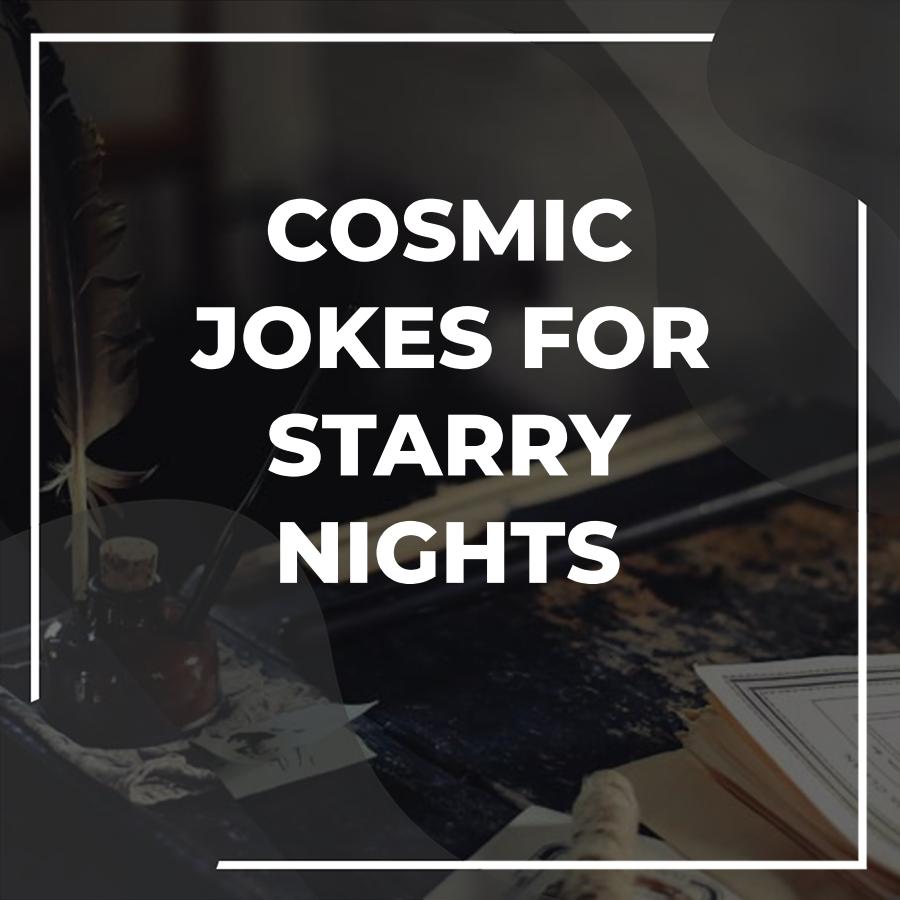Space puns might not be a universal language yet. However, they certainly have stellar potential to lighten the mood and bring a smile to anyone fascinated by the cosmos. With the vastness of space serving as a backdrop, there are countless opportunities to inject humor into conversations about the great unknown. So, what are space puns, and why do they matter? They are clever wordplays that use space-related terms and concepts to create humorous connections. These puns make science more approachable and fun, drawing in readers who might feel confused by complex topics.
Table of Contents
The Power of Wordplay in Astronomy
Wordplay can simplify complex scientific concepts. For example, calling the moon a “satellite” opens the door to puns. Saying, “Why did the moon break up with the sun? Because it needed space!” demonstrates how a simple joke can encourage learning while eliciting laughter.
Take the famous pun about astronauts: “How do you organize a space party? You planet!’ This joke brings a smile, and it gives a gentle nudge toward understanding both planetary bodies and the importance of planning.
Types of Space Puns
Space puns fall into several categories. Each category taps into the vastness of space, celestial bodies, space travel, and even science fiction. Here’s a closer look at what makes each type unique.
Celestial Bodies: Planetary Puns
Celestial bodies offer rich material for puns because of their fascinating names and characteristics. Here are a few stellar examples:
- “I need my space to planet.” This pun implies both the necessity of physical distance (from people) and the act of planning events.
- ‘What’s a black hole’s favorite instrument? The saxophone, because it sucks!” This joke highlights the nature of black holes while also referencing music.
- “Did you hear about the restaurant on the moon? Great food, no atmosphere!” This clever twist on food and space helps present scientific facts in a lighthearted way.
Space Travel: Journey Jokes
Exploring space is a serious venture, but that doesn’t mean we can’t have some fun with it! Here are some humorous quips related to space travel:
- “I wanted to become an astronaut, but I just couldn’t find the time to launch my career!” This sentence reflects the usual struggles of pursuing career goals while playfully using the term “launch.”
- “What did the alien say to the astronaut? It’s not you; it’s me. I’m not that into your galaxy.” This turn of phrase cleverly brings the concept of intergalactic relationships to light.
- “Why did the astronaut break up with his girlfriend? He needed space to grow!” Here, the word “space” serves two purposes, pointing to both distance and personal growth. This joke lands a laugh and connects with the audience.
Science Fiction: Cosmic Humor
Science fiction serves as an excellent foundation for puns. From classic novels to blockbuster movies, there’s ample material for comedy. Here are some examples:
- “I wanted to be a space writer, but I can’t find the right genre; it’s all too out of this world!” This wordplay integrates the concept of genre with the cosmic theme of “out of this world.”
- “The best part about the Milky Way is that it never runs out of chocolate!” This pun plays on the familiarity of the candy bar while underscoring the beauty of our galaxy.
- “Why did Darth Vader become a gardener? Because he wanted to grow some ‘dark side’ plants.” This example blends popular culture with space references.
Using Space Puns in Everyday Life
Space puns can seamlessly integrate into daily conversations. Here are some scenarios where puns can add a touch of humor:
Family Gatherings
A family gathering is an ideal setting for lighthearted banter. Picture this: someone brings a telescope to the gathering. You might chime in, “Let’s hope we see Saturn; it’s our only ring endorsement!” This joke allows for both humor and engagement around astronomy.
Social Media Posts
Using space puns in social media posts can attract attention and entertain followers. Captioning a beautiful image of the Milky Way with a pun like, “Join me for a trip through the Milky Way; it’s the best galaxy in the universe!” adds a personal touch and showcases your personality.
Classroom Activities
Teachers can harness the power of puns to engage students in discussions about space. For instance, a teacher could ask students to come up with their space puns as a fun class activity. This approach not only fosters creativity but also promotes learning through humor.
Creating Your Space Puns
Crafting your own space puns might sound challenging at first, but it can be a delightful exercise. Here are some tips to help you create your cosmic quips:
Understand the Terminology
The first step is to familiarize yourself with common space terminology. Terms like “gravity,” “orbit,” “black hole,” and “astrology” can serve as starting points for constructing your puns.
Play with Words
Start with a simple phrase and find synonyms or related terms that might lend themselves to puns. For example, “What do you call a planet that’s the life of the party? Jupiter, because it’s so jovial!”
Testing Your Puns
Before sharing your puns with others, test them on yourself. If you can’t help but chuckle, they’re likely ready to launch into the universe.
The Cultural Impact of Space Puns
Space puns have transcended mere humor and have started to become cultural references. In movies, books, and memes, these puns serve as a way to connect people to the wonders of the universe.
Movies and Television
Films like “The Martian” and shows like “The Big Bang Theory” often feature clever one-liners and puns that make scientific discussion more accessible. These moments not only create laughter but also spark interest in scientific topics.
Books and Literature
Authors are also leveraging the power of puns to add levity to their works. Consider books for younger readers that incorporate space themes alongside light humor. Titles like “There’s No Place Like Space” from the Cat in the Hat’s “Learning Library” utilize simple puns to engage young minds, making space education enjoyable.
Memes and Online Presence
The rise of social media platforms fuels a flood of space puns in memes. These jokes spread quickly among users, blending science and humor in a way that feels easy to enjoy. Examples like “I need more space” paired with an image of a crowded rocket illustrate the reach of these lighthearted jokes.
Engaging with Space Puns in Conversation
Incorporating space puns into your everyday speech can be both fun and engaging. Here’s how to weave them into your conversations:
Casual Conversations
Dropping a pun casually during a conversation can lighten the mood. For example, “I feel like the universe has aligned today; it’s just a stellar day!” This joke not only adds humor but also creates a positive atmosphere.
Networking Events
At networking events, using a space pun can break the ice. Try saying, “I’m not just reaching for the stars in my career; I’m trying to overachieve into the next galaxy!” Such statements demonstrate personality and creativity.
Online Chatting
In online communication, space puns can spice up a discussion. If someone mentions feeling lost about a topic, you could respond with, “Don’t worry, I’m here to help you navigate this cosmic journey!” This response makes for a more memorable exchange.
Additional Information
Space puns are not just lighthearted jokes; they hide some fascinating truths.
- The word “astronomy” comes from the Greek words “astron,” which means star, and “nomos,” which means law. Astronomers study the laws that control the stars, so puns about this topic give jokes a cosmic rules twist.
- The phrase “the Milky Way” could very well be a pun on how the galaxy was named after a spilled dairy product, as the ancient Greeks likened its appearance to milk spilled across the night sky.
- Black holes aren’t just cosmic enigmas; the name is a pun on their “black” nature, as not even light can escape their gravitational pull. This name brings “endless darkness” to a new level in the world of astronomy jokes.
- Jupiter’s Great Red Spot is a gigantic storm that’s been swirling for over 350 years, leading to puns about it being the solar system’s “longest-running weather report.”
- Neutron stars are so dense that a tablespoon of their material would weigh about as much as a herd of elephants, creating fodder for puns about carrying “heavy thoughts” from the universe.
- The term “light year” can be misinterpreted as a measure of time instead of distance. This misunderstanding inspires a popular pun, turning the speed of space travel into a “lighthearted” joke.
- Venus shares a similar size to Earth, earning the nickname “Earth’s twin.” However, its extreme conditions can inspire puns regarding the “darker side of sibling rivalry” in the cosmos.
- Comets often have tails that trail behind them, which opens the door to puns about how they “leave a blazing trail of puns behind in their wake.”
- The planet Uranus often appears in jokes because its name sounds like “your anus.” This similarity invites non-stop playful jokes about body humor set among the stars.
- Mars is known as the Red Planet, inspiring puns related to everything from martian drinks to marketing slogans promising “out of this world” sales that are too good to resist.
Questions Related to Space Puns
Q. What do you call a tick on the moon?
A. A luna-tick!
Q. Why did the sun go to school?
A. To get a little brighter!
Q. How do you throw a space party?
A. You planet!
Q. What did the alien say to the garden?
A. Take me to your weeder!
Q. Why did the astronaut break up with his girlfriend?
A. He needed space!
Q. What do you call a space magician?
A. A flying sorcerer!
Q. Why did the astronaut bring a pencil to space?
A. In case he needed to draw his conclusions!
Q. How do you know when the moon is going broke?
A. It’s down to its last quarter!
Q. Why did the star break up with the planet?
A. It needed some space to shine!
Q. What kind of songs do planets sing?
A. Neptunes!
Conclusion
Space puns are a fun and clever way to lighten up any conversation about the universe. These jokes add humor to astronomy, making complicated topics easier and more enjoyable to understand. So, the next time you’re chatting about stars or planets, consider sprinkling in some space puns. Whether it’s a quick joke or a quirky one-liner, they are sure to lift spirits and spark laughter. Keep exploring the cosmos, and don’t forget to have a pun-derful time along the way!







